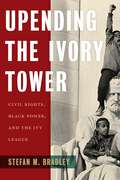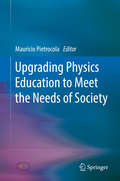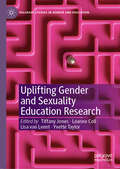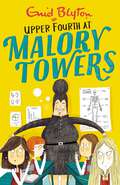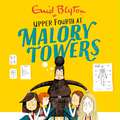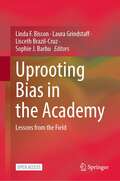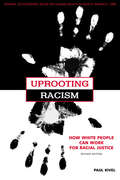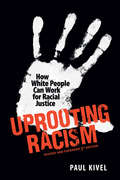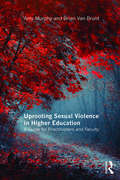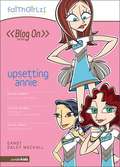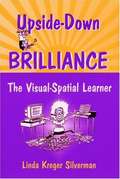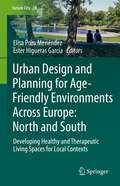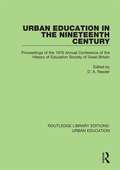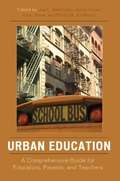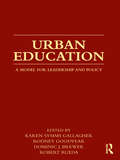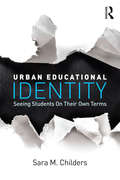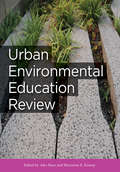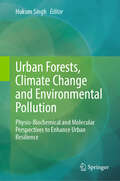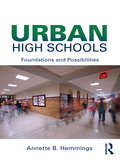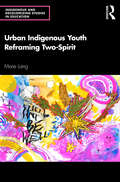- Table View
- List View
Upending the Ivory Tower: Civil Rights, Black Power, and the Ivy League
by Stefan M. BradleyWinner, 2019 Anna Julia Cooper and C.L.R. James Award, given by the National Council for Black StudiesFinalist, 2019 Pauli Murray Book Prize in Black Intellectual History, given by the African American Intellectual History SocietyWinner, 2019 Outstanding Book Award, given by the History of Education SocietyThe inspiring story of the black students, faculty, and administrators who forever changed America’s leading educational institutions and paved the way for social justice and racial progress The eight elite institutions that comprise the Ivy League, sometimes known as the Ancient Eight—Harvard, Yale, Princeton, Penn, Columbia, Brown, Dartmouth, and Cornell—are American stalwarts that have profoundly influenced history and culture by producing the nation’s and the world’s leaders. The few black students who attended Ivy League schools in the decades following WWII not only went on to greatly influence black America and the nation in general, but unquestionably awakened these most traditional and selective of American spaces. In the twentieth century, black youth were in the vanguard of the black freedom movement and educational reform. Upending the Ivory Tower illuminates how the Black Power movement, which was borne out of an effort to edify the most disfranchised of the black masses, also took root in the hallowed halls of America’s most esteemed institutions of higher education. Between the close of WWII and 1975, the civil rights and Black Power movements transformed the demographics and operation of the Ivy League on and off campus. As desegregators and racial pioneers, black students, staff, and faculty used their status in the black intelligentsia to enhance their predominantly white institutions while advancing black freedom. Although they were often marginalized because of their race and class, the newcomers altered educational policies and inserted blackness into the curricula and culture of the unabashedly exclusive and starkly white schools. This book attempts to complete the narrative of higher education history, while adding a much needed nuance to the history of the Black Power movement. It tells the stories of those students, professors, staff, and administrators who pushed for change at the risk of losing what privilege they had. Putting their status, and sometimes even their lives, in jeopardy, black activists negotiated, protested, and demonstrated to create opportunities for the generations that followed. The enrichments these change agents made endure in the diversity initiatives and activism surrounding issues of race that exist in the modern Ivy League. Upending the Ivory Tower not only informs the civil rights and Black Power movements of the postwar era but also provides critical context for the Black Lives Matter movement that is growing in the streets and on campuses throughout the country today. As higher education continues to be a catalyst for change, there is no one better to inform today’s activists than those who transformed our country’s past and paved the way for its future.
Upgrade Your Teaching: Understanding By Design Meets Neuroscience
by Judy Willis Jay McTigheHow can educators leverage neuroscience research about how the human brain learns? How can we use this information to improve curriculum, instruction, and assessment so our students achieve deep learning and understanding in all subject areas? Upgrade Your Teaching: Understanding by Design Meets Neuroscience answers these questions by merging insights from neuroscience with Understanding by Design (UbD), the framework used by thousands of educators to craft units of instruction and authentic assessments that emphasize understanding rather than recall.
Upgrading Physics Education to Meet the Needs of Society
by Maurício PietrocolaNations around the globe consider physics education an important tool of economic and social development and currently advocate the use of innovative strategies to prepare students for knowledge and skills acquisition. Particularly in the last decade, a series of revisions were made to physics curricula in an attempt to cope with the changing needs and expectations of society. Educational transformation is a major challenge due to educational systems’ resistance to change. Updated curriculum content, pedagogical facilities (for example, computers in a school), new teaching and learning strategies and the prejudice against girls in physics classes are all issues that have to be addressed. Educational research provides a way to build schemas and resources to promote changes in physics education. This volume presents physics teaching and learning research connected with the main educational scenarios.
Uplifting Gender and Sexuality Education Research (Palgrave Studies in Gender and Education)
by Tiffany Jones Yvette Taylor Leanne Coll Lisa Van LeentThis book showcases and celebrates the work of Gender and Sexuality Education scholars in order to challenge current negative interpretations of the field, and work towards new shared visions. The editors and contributors call for, affirm and offer examples of pathways towards exciting and dynamic collaborative work in Gender and Sexuality in Education. In doing so, they also acknowledge the various complexities of this field, and detail the context-specific barriers faced by academics and activists. Drawing upon a range of global case studies, this book sets out information and advice from cross-sector experts to set an agenda of mutual supportiveness, and to smooth pathways for future collaboration. Above all, this book is a call to action to uplift the field – and each other – in challenging environments. This ground-breaking book will be of interest and value to scholars of Gender and Sexuality Education research.
Upper Fourth: Book 4
by Enid BlytonWelcome to Malory Towers, where there's more to life than lessons!Darrell Rivers is delighted to be Head Girl of her form - and this year her sister Felicity joins Malory Towers too. Most of the time Darrell couldn't be prouder of Felicity, but she's much less keen on her sister's trouble-making new friend. With twins Connie and Ruth also causing problems, Darrell's first term in charge is a big challenge... Now adapted for television, on CBBC.Between 1946 and 1951, Enid Blyton wrote six novels set at Malory Towers. Book 4 was first published in 1949. This edition features the classic text and is unillustrated.*Malory Towers ®, Enid Blyton ® and Enid Blyton's signature are registered trade marks of Hodder & Stoughton Limited. No trade mark or copyrighted material may be reproduced without the express written permission of the trade mark and copyright owner.
Upper Fourth: Book 4 (Malory Towers #4)
by Enid BlytonWelcome to Malory Towers, where there's more to life than lessons!Darrell Rivers is delighted to be Head Girl of her form - and this year her sister Felicity joins Malory Towers too. Most of the time Darrell couldn't be prouder of Felicity, but she's much less keen on her sister's trouble-making new friend. With twins Connie and Ruth also causing problems, Darrell's first term in charge is a big challenge... Between 1946 and 1951, Enid Blyton wrote six novels set at Malory Towers. Book 4 was first published in 1949. This recording is based on the classic text.*(P) 2019 Hodder & Stoughton LimitedMalory Towers ®, Enid Blyton ® and Enid Blyton's signature are registered trade marks of Hodder & Stoughton Limited. No trade mark or copyrighted material may be reproduced without the express written permission of the trade mark and copyright owner.
Upper Fourth: Book 4 (Malory Towers #4)
by Enid BlytonWelcome to Malory Towers, where there's more to life than lessons!Darrell Rivers is delighted to be Head Girl of her form - and this year her sister Felicity joins Malory Towers too. Most of the time Darrell couldn't be prouder of Felicity, but she's much less keen on her sister's new friend, troublemaker and rebel June. With twins Connie and Ruth also causing problems, Darrell's first term in charge is a big challenge... Now adapted for television, on CBBC.Between 1946 and 1951, Enid Blyton wrote six novels set at Malory Towers. Book 4 was first published in 1949. This edition features the classic text and is unillustrated.*Malory Towers ®, Enid Blyton ® and Enid Blyton's signature are registered trade marks of Hodder & Stoughton Limited. No trade mark or copyrighted material may be reproduced without the express written permission of the trade mark and copyright owner.
Upper Fourth: Book 4 (Malory Towers #4)
by Enid BlytonWelcome to Malory Towers, where there's more to life than lessons!Darrell Rivers is delighted to be Head Girl of her form - and this year her sister Felicity joins Malory Towers too. Most of the time Darrell couldn't be prouder of Felicity, but she's much less keen on her sister's new friend, troublemaker and rebel June. With twins Connie and Ruth also causing problems, Darrell's first term in charge is a big challenge... Now adapted for television, on CBBC.Between 1946 and 1951, Enid Blyton wrote six novels set at Malory Towers. Book 4 was first published in 1949. This edition features the classic text and is unillustrated.*Malory Towers ®, Enid Blyton ® and Enid Blyton's signature are registered trade marks of Hodder & Stoughton Limited. No trade mark or copyrighted material may be reproduced without the express written permission of the trade mark and copyright owner.
Uprooting Bias in the Academy: Lessons from the Field
by Laura Grindstaff Linda F. Bisson Lisceth Brazil-Cruz Sophie J. BarbuThis open access book analyzes barriers to inclusion in academia and details ways to create a more diverse, inclusive environment. It describes the implementation of UC Davis ADVANCE, a grant program funded by the National Science Foundation, to increase the hiring and retention of underrepresented scholars in the STEM fields (science, technology, engineering and mathematics) and foster a culture of inclusion for all faculty. It first describes what the barriers to inclusion are and how they function within the broader society. A key focus here is the concept of implicit bias: what it is, how it develops, and the importance of training organizational members to recognize and challenge it. It then discusses the limitations of data collection that is guided by the convention assumption that being diverse automatically means being inclusive. Lastly, it highlights the importance of creating a collaborative, interdisciplinary, and institution-wide vision of an inclusive community.
Uprooting Racism
by Howard Zinn Paul KivelContinuously at the top of New Society Publishers' best-seller list for five years, Uprooting Racism has sold over 25,000 copies since its first printing. Substantially revised and expanded, the new edition has more tools to help white people understand and stand-up to racism. Uprooting Racism explores the manifestations of racism in politics, work, community, and family life. It moves beyond the definition and unlearning of racism to address the many areas of privilege for white people and suggests ways for individuals and groups to challenge the structures of racism. Uprooting Racism's welcoming style helps readers look at how we learn racism, what effects it has on our lives, its costs and benefits to white people, and what we can do about it. In addition to updating existing chapters, the new edition of Uprooting Racism explores how entrenched racism has been revealed in the new economy, the 2000 electoral debacle, rising anti-Arab prejudice, and health care policy. Special features include exercises, questions, and suggestions to engage, challenge assumptions, and motivate the reader towards social action. The new edition includes an index and an updated bibliography.
Uprooting Racism
by Paul KivelIn 2008 the United States elected its first black president, and recent polls show that only twenty-two percent of white people in the United States believe that racism is a major societal problem. On the surface, it may seem to be in decline. However, the evidence of discrimination persists throughout our society. Segregation and inequalities in education, housing, health care, and the job market continue to be the norm. Post 9/11, increased insecurity and fear have led to an epidemic of the scapegoating and harassment of people of color. Uprooting Racism offers a framework for understanding institutional racism. It provides practical suggestions, tools, examples, and advice on how white people can intervene in interpersonal and organizational situations to work as allies for racial justice. Completely revised and updated, this expanded third edition directly engages the reader through questions, exercises, and suggestions for action, and takes a detailed look at current issues such as affirmative action, immigration, and health care. It also includes a wealth of information about specific cultural groups such as Muslims, people with mixed-heritage, Native Americans, Jews, recent immigrants, Asian Americans, and Latinos. Previous editions of Uprooting Racism have sold more than fifty thousand copies. Accessible, personal, supportive, and practical, this book is ideal for students, community activists, teachers, youth workers, and anyone interested in issues of diversity, multiculturalism, and social justice. Paul Kivel is an award-winning author and an accomplished trainer and speaker. He has been a social justice activist, a nationally and internationally recognized anti-racism educator, and an innovative leader in violence prevention for over forty years.
Uprooting Sexual Violence in Higher Education: A Guide for Practitioners and Faculty
by Amy Murphy Brian Van BruntWith national conversation turned toward sexual assault on college campuses, knowing how to identify, prevent, and address these incidents in a safe, and productive way is essential for administrators and faculty. Uprooting Sexual Violence in Higher Education provides colleges and universities with a foundational understanding of twelve risk factors related to sexual assault, stalking, and intimate partner violence. By presenting a blend of theory, research, and the personal reflections of professionals ‘on the front lines,’ this book provides insights into the motivations, attitudes, and behaviors behind sexual assault on campus, as well as strategies for mitigating these risk factors in an effort to tailor prevention efforts. Whether you are seeking a way to navigate the recent regulations on sexual violence from the federal government or merely wish to safeguard the welfare of students on your campus, this book will provide the neccesary, and invaluable foundation you need to empower, respect, and support all students.
Upselling Techniques: That Really Work!
by Stephan SchiffmanA Simon & Schuster eBook. Simon & Schuster has a great book for every reader.
Upsetting Annie
by Dandi Daley MackallEverything seems to be going well for fifteen-year-old Annie, between her popular blog, good friends, and cheerleading, but when her cousin Shawna returns from Paris and becomes the center of attention, Annie cannot help but be jealous.
Upsetting Composition Commonplaces
by Ian BarnardIn Upsetting Composition Commonplaces, Ian Barnard argues that composition still retains the bulk of instructional practices that were used in the decades before poststructuralist theory discredited them. While acknowledging that some of the foundational insights of poststructuralist theory can be difficult to translate to the classroom, Barnard upends several especially intransigent tenets that continue to influence the teaching of writing and how students are encouraged to understand writing. Using six major principles of writing classrooms and textbooks—clarity, intent, voice, ethnography, audience, and objectivity—Barnard looks at the implications of poststructuralist theory for pedagogy. While suggesting some evocative poststructuralist pedagogical practices, the author focuses on diagnosing the fault lines of composition's refusal of poststructuralism rather than on providing "solutions” in the form of teaching templates. Upsetting Composition Commonplaces addresses the need to more effectively engage in poststructuralist concepts in composition in an accessible and engaging voice that will advance the conversation about relations between the theory and teaching of writing.
Upside-Down Brilliance: The Visual-Spatial Learner
by Linda Kreger SilvermanThe book is about the gifts of the right hemisphere. Adults and children alike will find in this book an opening to hidden abilities they may not even know they have. This book is for parents and teachers, for visual-spatial learners of all ages, for people who live with artists, musicians, inventors, and computer junkies, and for anybody who wants to know how intelligence on this planet is evolving.
Urban Design and Planning for Age-Friendly Environments Across Europe: Developing Healthy and Therapeutic Living Spaces for Local Contexts (Future City #19)
by Elisa Pozo Menéndez Ester Higueras GarcíaThis book represents a multidisciplinary and international vision across different countries in Europe that are facing similar challenges about ageing and quality of life in present cities. It is divided in three main topics from the global context of health in cities and reduction of health inequities to the current research of different study cases, focusing on residential models and the relationship with the built environment. The third chapter illustrates best practices with some study cases from different cities in Europe. Friendlier environments for older people come together with the need of innovation, smart and updated technologies, healthier environments and mitigation of climate change. Health re-appears nowadays as one of the priorities for urban planning and design, not only for the communicable diseases and the effect of the pandemics, but also for the non-communicable diseases, that were also triggering the wellbeing and equity of our cities. Indeed, the Covid-19 pandemic has highlighted health inequities and vulnerabilities of those areas of the city that were already deprived and facing other health problems, such as obesity, diabetes, social isolation, respiratory problems or mental health issues, specifically applying for vulnerable groups. Older adults have been one of the most affected groups from the pandemic’s threats and derived consequences. In this context, the care crisis arises intertwined with the design and planning of our cities, where there is an urgent need to regenerate our environments with a perspective of sustainability, inclusion, and health prevention and promotion. From the global urban challenges to the specific contextualisation of each city and study cases, each chapter offers an updated insight of the main questions that we should consider to address urban planning and design from the perspective of ageing and social inclusion in European cities.
Urban Education in the 19th Century: Proceedings of the 1976 Annual Conference of the History of Education Society of Great Britain (Routledge Library Editions: Urban Education #3)
by D. A. ReederFirst published in 1977, Urban Education in the 19th Century is a collection based on the conference papers of the annual 1976 conference for the History of Education Society. The book illustrates a variety of ways of elucidating the connections between education and the city, mainly in nineteenth-century Britain. Essays cover political, geographical, demographic and socio-structural aspects of urbanization. There is an emphasis on comparative studies of urban educational developments and attention is paid to the perceptions of the nineteenth-century city and its problems, especially for child life, as well as to the realities of urban change
Urban Education: A Comprehensive Guide For Educators, Parents, And Teachers
by Joe L. Kincheloe Kecia Hayes Karel Rose Philip M. AndersonMaintaining that urban teaching and learning is characterized by numerous contradictions, this book proposes that there is a wide range of social, cultural, psychological, and pedagogical knowledge that urban educators must possess in order to engage in effective and transformative practice. It is necessary for teachers in urban schools to be scholar-practitioners, as opposed to bureaucrats who only follow rather than analyze, understand, and create. Ten major sections cover the myriad issues of urban education as it exists today: context of urban education, race and ethnicity, social justice, teaching and pedagogy, power and urban education, language issues, cultural issues of urban schools as seen in the media, research in city schools, aesthetics and the proximity of cultural institutions, and education policy. Sixty one essays written by specialists in teacher education; public policy; sociology; psychology; applied linguistics; forestry; urban studies; school administration; cultural studies; evaluation; and linguistics, provide a blueprint for scholars, teachers, parents, urban politicians, school administrators, policy professionals, and others seeking to understand the situation of urban schools across America today.
Urban Education: A Model for Leadership and Policy
by Robert Rueda Dominic Brewer Karen Symms Gallagher Rodney GoodyearMany factors complicate the education of urban students. Among them have been issues related to population density; racial, ethnic, cultural, and linguistic diversity; poverty; racism (individual and institutional); and funding levels. Although urban educators have been addressing these issues for decades, placing them under the umbrella of "urban education" and treating them as a specific area of practice and inquiry is relatively recent. Despite the wide adoption of the term a consensus about its meaning exists at only the broadest of levels. In short, urban education remains an ill-defined concept. This comprehensive volume addresses this definitional challenge and provides a 3-part conceptual model in which the achievement of equity for all -- regardless of race, gender, or ethnicity – is an ideal that is central to urban education. The model also posits that effective urban education requires attention to the three central issues that confronts all education systems (a) accountability of individuals and the institutions in which they work, (b) leadership, which occurs in multiple ways and at multiple levels, and (c) learning, which is the raison d'être of education. Just as a three-legged stool would fall if any one leg were weak or missing, each of these areas is essential to effective urban education and affects the others.
Urban Educational Identity: Seeing Students on Their Own Terms
by Sara M. ChildersWINNER 2017 O.L. Davis, Jr. AATC Outstanding Book in Education Award WINNER 2017 American Educational Studies Association Critics Choice Award Through rich ethnographic detail, Urban Educational Identity captures the complexities of urban education by documenting the everyday practices of teaching and learning at a high-achieving, high-poverty school. Drawing on over two years of intensive fieldwork and analysis, author Sara M. Childers shows how students, teachers, and parents work both within and against traditional deficit discourses to demonstrate the challenges and paradoxes of urban schooling. It offers an up-close description of how macro-government policies are interpreted, applied, and even subverted for better or worse by students as active agents in their own education. The book moves on to develop and analyze the concept of "urban cachet," tracing how conceptions of race and class were deeply entwined with the very practices for success that propelled students towards graduation and college entrance. A poignant, insightful, and practical analysis, Urban Educational Identity is a timely exploration of how race and class continue to matter in schools.
Urban Environmental Education Review (Cornell Series in Environmental Education)
Urban Environmental Education Review explores how environmental education can contribute to urban sustainability. Urban environmental education includes any practices that create learning opportunities to foster individual and community well-being and environmental quality in cities. It fosters novel educational approaches and helps debunk common assumptions that cities are ecologically barren and that city people don't care for, or need, urban nature or a healthy environment.Topics in Urban Environmental Education Review range from the urban context to theoretical underpinnings, educational settings, participants, and educational approaches in urban environmental education. Chapters integrate research and practice to help aspiring and practicing environmental educators, urban planners, and other environmental leaders achieve their goals in terms of education, youth and community development, and environmental quality in cities.The ten-essay series Urban EE Essays, excerpted from Urban Environmental Education Review, may be found here: naaee.org/eepro/resources/urban-ee-essays. These essays explore various perspectives on urban environmental education and may be reprinted/reproduced only with permission from Cornell University Press.
Urban Forests, Climate Change and Environmental Pollution: Physio-Biochemical and Molecular Perspectives to Enhance Urban Resilience
by Hukum SinghThis book contributes significantly to the international literature by bringing forth a novel and comprehensive exploration of urban resilience in the face of climate change and environmental pollution. Its focus on integrating physiological, biochemical, and molecular dimensions distinguishes it from existing literature. The book offers several key contributions, including an interdisciplinary approach to understanding the complex interactions within urban ecosystems. It includes cutting-edge insights that have not been extensively explored in existing literature, practical applications, and evidence-based strategies to enhance urban sustainability and resilience. The book has a global relevance to a diverse international readership and provides strategic guidance to policymakers and urban planners when making decisions to develop evidence-based strategies that cater to the specific challenges of cities. Urban forests play a critical role in enhancing the resilience of cities by providing numerous benefits, including improved air quality, reduced urban heat island effect, and enhanced biodiversity, ultimately improving urban health. Besides, urban forests are a crucial natural-based solution (NbS) to mitigate air pollution and climate change impacts in cities. However, in the face of climate change and environmental pressures, urban forests face significant challenges to their survival and functionality. This book explores the complex morpho-physio-biochemical and molecular changes that enable urban forests to flourish amidst climate change and environmental pollution. It examines how urban trees modulate their morphological structures, including root systems and physiological and biochemical functioning, and molecular alterations to withstand changing urban climatic and environmental conditions.
Urban High Schools: Foundations and Possibilities (Sociocultural, Political, and Historical Studies in Education)
by Annette B. HemmingsThis multidisciplinary overview introduces readers to the historical, sociological, anthropological, and political foundations of urban public secondary schooling and to possibilities for reform. Focused on critical and problematic elements, the text provides a comprehensive description and analyses of urban public high schooling through different yet intertwined disciplinary lenses. Students and researchers seeking to inform their work with urban high schools from social, cultural, and political perspectives will find the theoretical frameworks and practical applications useful in their own studies of, or initiatives related to, urban public high schools. Each chapter includes concept boxes with synopses of key ideas, summations, and discussion questions.
Urban Indigenous Youth Reframing Two-Spirit (Indigenous and Decolonizing Studies in Education)
by Marie LaingThis book offers insights from young trans, queer, and two-spirit Indigenous people in Toronto who examine the breadth and depth of meanings that two-spirit holds. Tracing the refusals and desires of these youth and their communities, Urban Indigenous Youth Reframing Two-Spirit expands critical conversations on queerness, Indigeneity, and community and simultaneously troubles the idea that articulating a definition of two-spirit is a worthwhile undertaking. Beyond the expansion of these conversations, this book also seeks to empower community members, educators, and young people — both Indigenous and non-Indigenous — to better support the self-determination of trans, queer, and two-spirit Indigenous youth. By including a research zine and community discussion guidelines, Laing demonstrates the possibility of powerful change that comes from Indigenous people creating spaces to share knowledge with one another.
